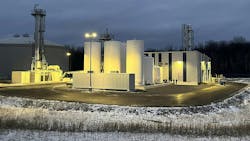2024 Airport Business Projects of the Year: SYR Glycol Recycling Facility
A new glycol collection and recycling facility at Syracuse Hancock International Airport (SYR) is using a “full cycle” approach and a technological first to create environmental and financial benefits on-airport.
Aeromag, a company specializing in deicing aircraft and recycling glycol (the main component in aircraft deicing fluid), is the owner and operator of the recycling facility. The company invested more than $19.4 million in the development and installation of its “RRR” concept, which means recover fluid after deicing, recycle that fluid on site, then certify and reuse for deicing.
Technology used in the process – the glycol recycling evaporator – can treat spent aircraft deicing fluid as low as .25 percent glycol to water. While the low content evaporator has been used in other solvent recycling systems, Gabriel Lepine, Executive Vice President, Operations and Development at Aeromag, says this is the first on-airport evaporator in the world to concentrate spent deicing fluid below 1% efficiently and at such a scale.
At SYR, three dedicated deice pads feed the recycling facility with spent deicing fluid, which otherwise would have gone to a wastewater treatment facility but instead is recycled for reuse. The recycling byproducts are glycol, a high valuable raw material and clean water.
Annually, the SYR Glycol Recycling Facility will produce up to 550,000 gallons of Type I aircraft deicing fluid and 5 to 7 million gallons of reusable water.
Based on current average flight volumes, SYR will use about 50% of the facility’s total capacity, resulting in an opportunity to provide recycled glycol for deicing services to neighboring airports in Upstate New York.
Syracuse Regional Airport Authority (SRAA) Executive Director Jason Terreri reports talks are underway to give other airports an opportunity to dispose of used deicing fluid at SYR at little to no cost. “Once refined at SYR, that glycol will then be resold to airlines operating at SYR at approximately 10-15% below market rate,” he said. “This will help our airline partners realize cost savings and a more secure supply chain.”
The new facility will reduce the airport’s water consumption and carbon footprint (up to 16.5 million pounds annually) compared to the traditional glycol disposal and creation of new deicing fluid.
In the full cycle approach:
- A low-concentration evaporator takes fluid from 0.25% to 10% glycol concentrations.
- The 10% glycol is filtered to remove thickeners or residual oils and fuel.
- A second evaporator processes the 10% fluid up to 50% glycol concentration.
- A distiller separates the remaining water, taking the fluid to 99.5% pure glycol.
- The pure glycol is mixed with an additive pack from an AMS 1424-certified Type I deicing fluid manufacturer to create aircraft deicing fluid on airport.
“This project is an excellent example of our Regional Responsibility efforts,” said Terreri. “As one of our core values, we know that being a good community partner means placing an emphasis on environmental sustainability. Not only will we recycle the glycol utilized at our airport, but our partnership with airports across the region will extend that environmental stewardship well beyond our fence line.”
The SRAA and Aeromag partnered with Burns & McDonnell to provide design-build services and Vilokan ADF Solutions as the specialty equipment supplier.
To address limited storage for the previous season’s collected glycol effluent, the project team sited and staged the project to allow for operation of the low-concentration evaporator to begin three months before the rest of the project. The glycol recycling facility held its official inauguration in fall 2023, before the first heavy snow in the region, going from initial design to full operation in just 18 months.
Prior to the construction of the new facility, the airport had an existing glycol collection, storage, and treatment system with two 47,500-barrel stormwater holding tanks, added in 2018, and a lagoon.
Location: Syracuse Hancock International Airport (SYR), Syracuse, New York
Project: SYR Glycol Recycling Facility
Completion: November 2023
Key Participants: Syracuse Regional Airport Authority, Burns & McDonnell, Aeromag, Vilokan ADF Solutions
Cost: $19.4 million
About the Author
Rebecca Kanable
Assistant Editor
Rebecca Kanable, a veteran journalist, worked with Endeavor Business Media's aviation group from 2021 to 2024 as assistant editor of Airport Business, AMT and Ground Support Worldwide. She previously worked for various publications, including trade magazines and newspapers.

